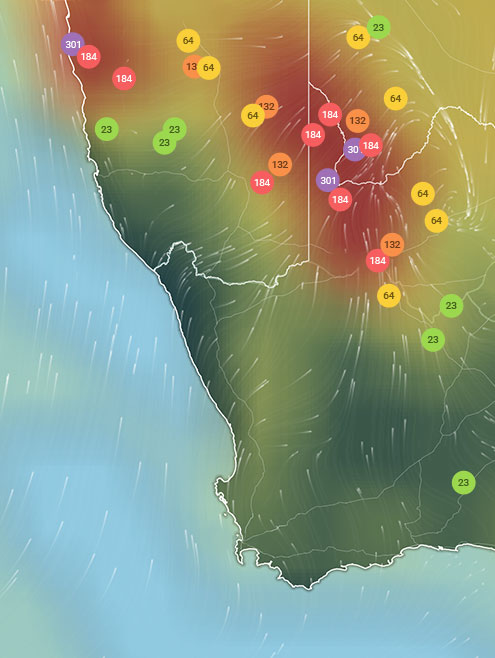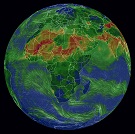Get a monitor and contributor to air quality data in your city.
1.9K people follow this city






AIR QUALITY DATA CONTRIBUTORS
Find out more about contributors and data sources| Index | None | ||
| Tree pollen | None | ||
| Grass pollen | None | ||
| Weed pollen | None |
| Weather | Broken clouds |
| Temperature | 53.6°F |
| Humidity | 84% |
| Wind | 2 mp/h |
| Pressure | 29.8 Hg |
| # | city | US AQI |
|---|---|---|
| 1 | Cold Lake, Alberta | 42 |
| 2 | West End, British Columbia | 41 |
| 3 | Valemount, British Columbia | 39 |
| 4 | Lac La Biche, Alberta | 37 |
| 5 | North Vancouver, British Columbia | 36 |
| 6 | Patricia Mcinnes, Alberta | 36 |
| 7 | Burnaby, British Columbia | 35 |
| 8 | Courtenay, British Columbia | 35 |
| 9 | Fort Mckay, Alberta | 35 |
| 10 | Smithers, British Columbia | 35 |
(local time)
SEE WORLD AQI RANKING
| # | station | US AQI |
|---|---|---|
| 1 | 118 Risebrough Circuit | 53 |
(local time)
SEE WORLD AQI RANKINGUS AQI
53
live AQI index
Moderate
| Air pollution level | Air quality index | Main pollutant |
|---|---|---|
| Moderate | 53 US AQI | PM2.5 |
| Pollutants | Concentration | |
|---|---|---|
| PM2.5 | 13.2µg/m³ | |
PM2.5
x2.6
PM2.5 concentration in Markham is currently 2.6 times the WHO annual air quality guideline value
| Sensitive groups should reduce outdoor exercise | |
| Close your windows to avoid dirty outdoor air GET A MONITOR | |
| Sensitive groups should wear a mask outdoors GET A MASK | |
| Sensitive groups should run an air purifier GET AN AIR PURIFIER |
| Day | Pollution level | Weather | Temperature | Wind |
|---|---|---|---|---|
| Tuesday, Apr 16 | Good 19 AQI US | 46.4° 39.2° | ||
| Wednesday, Apr 17 | Good 33 AQI US | 51.8° 44.6° | ||
| Thursday, Apr 18 | Good 35 AQI US | 53.6° 39.2° | ||
| Today | Moderate 53 AQI US | 53.6° 39.2° | ||
| Saturday, Apr 20 | Good 15 AQI US | 44.6° 33.8° | ||
| Sunday, Apr 21 | Good 7 AQI US | 50° 32° | ||
| Monday, Apr 22 | Good 10 AQI US | 48.2° 30.2° | ||
| Tuesday, Apr 23 | Good 28 AQI US | 46.4° 42.8° | ||
| Wednesday, Apr 24 | Good 36 AQI US | 46.4° 28.4° | ||
| Thursday, Apr 25 | Good 4 AQI US | 39.2° 30.2° |
Interested in hourly forecast? Get the app
Markham is a city in the Regional Municipality of York in Southern Ontario, Canada. It is approximately 30 kilometres north east of Ontario. According to a 2016 census, Markham had a population of approximately 330,000 people.
At the beginning of 2021, Markham was enjoying a period of “Good” quality air with a US AQI reading of just 29. This is according to the classifications suggested by the World Health Organisation (WHO).
The recorded level of the PM2.5 pollutant was 7.1 µg/m³. With levels as low as these, windows and doors can be safely opened to allow the ingress of fresh, clean air. Outdoor activities of all types can be enjoyed without fear.
Air pollution can be of natural origin (volcanic eruption, pollen, forest fires, etc.), but it mainly comes from human or anthropogenic activities (transport, individual and collective heating, industries, agriculture, incineration of household waste, domestic activities etc. Pollutants can be divided into two main categories which are primary and secondary.
Primary pollutants are directly released into the air by an identified source, most of the time linked to human activities (road traffic, industry, heating, agriculture, etc.). They can include nitrogen monoxide (NO), sulphur dioxide (SO2), carbon monoxide (CO), heavy metals (lead, arsenic, cadmium and nickel), organic compounds volatiles (VOC’s) and Polycyclic Aromatic Hydrocarbons (PAHs including benzo (a) pyrene).
Secondary pollutants are not directly released into the air. They are formed from chemical reactions between different primary pollutants, already present in the air.
For example ozone (O3), which is formed when nitrogen oxides and hydrocarbons react under the influence of ultraviolet radiation from the sun (this is partly why ozone is more present in the spring and in summer). Acid rain, which is the result of the acidification of the rainwater having captured various pollutants but also the dry deposition of these pollutants sulphur dioxide and nitric oxides (SO2 and NOx).
Because of its proximity to Ontario, many people will commute on a daily basis between the two places. This will create a lot of emissions which will reduce the quality of air overall. Recorded levels of pollution are always at their highest during the rush-hour periods.
There are several main arterial roads which pass through or run very close to the city centre which again reduces the quality of air.
Environment Canada monitors the state of the air quality and issues warnings if they suspect the air quality is going to pose a threat to the local residents.
They would issue a special air quality statement for several communities in the province including Newmarket, Georgina, Northern York Region, Vaughan, Richmond Hill and Markham. This would be issued due to the possibility of deteriorating air quality. According to Environment Canada, hot and sunny conditions cause increasing ground-level ozone concentrations in the area. Individuals may experience symptoms such as increased coughing, throat irritation, headaches or shortness of breath. Children under 14 years of age, senior citizens, and those with pre-existing health problems, cardiovascular or lung disease, such as asthma, are especially at risk.
It is estimated that in Markham, due to travelling to work and school, per passenger is produced annually 1,236.84kg of carbon dioxide (CO2). 56.81 trees need to be planted for each passenger to produce enough oxygen to cover that.
Ontario regulates air pollutants from a variety of sources, including local industrial and commercial facilities, to limit exposure to substances that can harm human health and the environment.
If a business releases any pollutants into the air, it must follow Ontario Regulation 419/05 by complying with any standards that may apply.
Air quality standards set the limit for pollutants released into the air. They are enforceable (they are recognised in the eyes of the law). To see if a company is meeting the standards, the local authorities compare the estimated maximum concentration of the pollutant at its point of contact with the air quality standard for that pollutant.
If a company can show that the maximum concentration of the pollutant it releases into the air does not exceed the limit established by the standard relating to this pollutant, Regulation 419/05 does not impose any other requirements on it. Most businesses in Ontario meet general air quality standards, which is one reason why the air quality is overall very good.
One of the most dangerous pollutants is the microscopic PM2.5 particulate matter. It is a complex mixture that may contain soot, smoke, metals, nitrates, sulphates, dust, water and tyre rubber and brake dust. It can be directly emitted, as in smoke from a fire, or it can form in the atmosphere from reactions of gases such as nitrogen oxides.
The size of particles is directly linked to their potential for causing health problems. Small particles (known as PM2.5 or fine particulate matter) pose the greatest problems because they bypass the body’s natural defences and can get deep into the lungs and potentially your bloodstream. Exposure to such particles can affect both your lungs and your heart.
Long-term exposure to particulate pollution can result in significant health problems including increased respiratory symptoms, such as irritation of the airways, coughing or difficulty breathing. Decreased lung function and aggravated asthma. The development of chronic respiratory disease in children and the development of chronic bronchitis or chronic obstructive lung disease. Irregular heartbeat and nonfatal heart attacks are more frequent because of the polluted air. Premature deaths of people with pre-existing heart or lung disease, including death from lung cancer are conditions that are exacerbated because of these deadly microscopic particles.
Hot, humid weather may elevate pollution levels and as such, individuals may experience symptoms such as increased coughing, throat irritation, headaches or shortness of breath, according to the special air quality statement. Hot and sunny conditions are expected to cause increasing ground-level ozone (O3) concentrations.
1Contributor
Anonymous Contributor

1 station
1 Data source